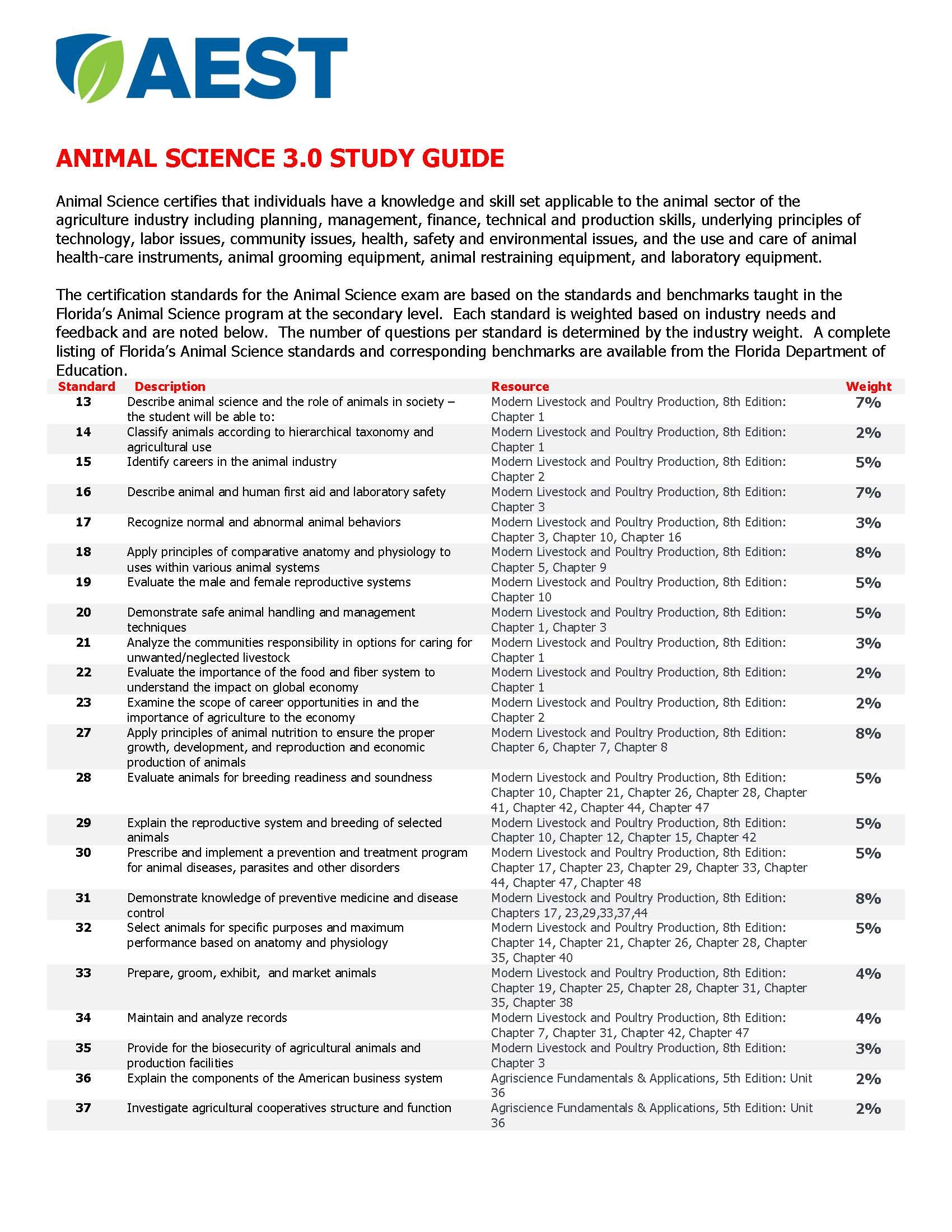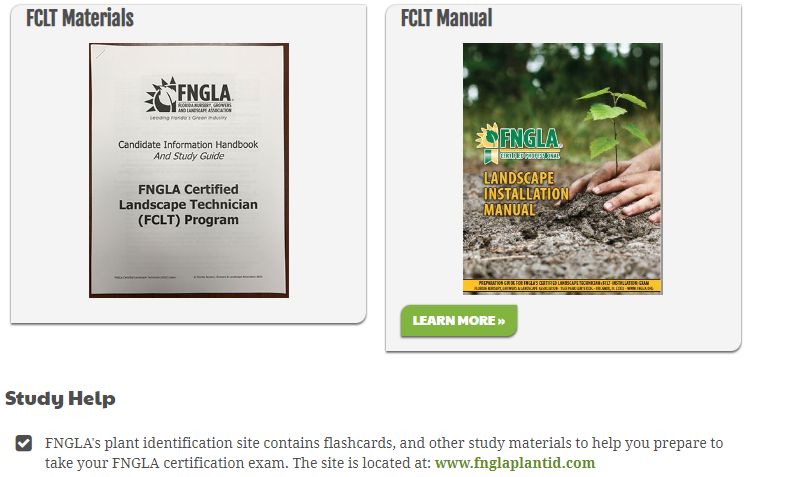Introduction
The first two publications (#AEC776 “Introduction to Industry Certifications” and #AEC777 “Getting Started”) in this series addressed topics regarding preparation for industry certification exams. Various industry certifications are available to students enrolled in a school-based agricultural education (SBAE) program. Aside from the certifications themselves, this series has also discussed the testing platforms, organizations, and entities that provide industry certification exams for students. Note that different testing platforms have unique registration steps, and certification exams will have a range of costs and fees associated with them.
Certification exam costs and fees can quickly add up, so understanding how to locate materials and resources as the instructor is important in ensuring that students are prepared to take the exams. This document will help teachers identify available materials and resources to support classroom learning and prepare students for their certification exams. Industry certifications offer a wide range of industry-validated content and skills, which can help prepare students for successful careers in all facets of the agricultural industry. As you begin to explore the vast array of resources, be aware of the specific testing protocol and procedures, including the use of valid and reliable lesson and exam preparation materials.
Where to Find Resources
Many of the testing platforms and providers supply study materials and information on their website pages. For example, Ducks Unlimited uses a testing entity known as iCEV. This testing platform provides secure testing technology and a study guide for the Ducks Unlimited Ecology and Conservation Management certification (n.d.). A similar example would be the Agricultural Mechanics Specialist certification. The issuing provider is known as the Agricultural Education Services and Technology Inc. (AEST) (Dobson, 2020). AEST provides a study guide including educational standards that align with the exam, corresponding numbers to reference those standards, and sample questions (AEST, n.d.-a). Both AEST and iCEV offer many study guides (as seen in Figure 1 and Figure 2), practice tests, and other resources for teachers and students.

Credit: AEST (n.d.-c)

Credit: FNGLA (n.d.)
How to Prepare and What to Avoid
Teachers may create their own review using their own notes, tests, and quizzes. However, teachers should not ask students questions about the material on the certification exam to create study guides (Florida Department of Education, n.d.-d.). This is considered a testing violation and should be reported to the Florida Department of Education within 5 business days (Florida Department of Education, n.d.-b). Other examples of testing violations include, but are not limited to, assisting students with test questions, previewing test material, and taking screenshots/pictures of active exam material. Teachers are prohibited from administering exams to themselves, to students under their direct supervision, or to a family member. It is also prohibited to complete a certification exam under a name other than one’s legal name (Florida Department of Education, n.d.-d).
Industry certification tests can be beneficial for both students and teachers. Aside from students receiving the certification, certification exams also award the school-based agricultural education programs with a monetary incentive. Being that industry certifications are monitored by the state, teachers should review testing rules and procedures frequently to avoid any testing indiscretions (Florida Department of Education, n.d.-c).
Issuing providers and organizations that use different testing platforms may also have additional policies and procedures to follow. For example, the providers and organizations that use the AEST testing platform require proctors to register for an account with AEST. Once proctors have been approved and their accounts are activated, the proctors are sent materials from AEST that should be reviewed to prepare for test day (AEST, n.d.-e).
Industry certification exams are a great tool for any agricultural education program. Improper registration and improper use of study materials are simple mistakes that can be made by educators daily, resulting in poor impacts on agricultural education programs. However, those mistakes are completely avoidable and addressed throughout the EDIS series, School-Based Agricultural Education Industry Certifications. The three publications supply additional information such as a table of issuing providers and organizations, as well as a brief history of industry certification testing and the CAPE act. This series should be used as a guide and resource for all educators looking to enhance their agricultural education program.
References
Agriculture Education Services and Technology (AEST). (n.d.-a). Agricultural mechanics study guide. Retrieved January 11, 2023, from https://aest.ag/certify/wp-content/uploads/2017/09/Study-Guide-Ag-Mechanics-Specialist.pdf
Agriculture Education Services and Technology (AEST). (n.d.-b). Animal science. Retrieved January 31, 2023, from https://aest.ag/certify/certifications/animal-science/
Agriculture Education Services and Technology (AEST). (n.d.-c). Animal science 3.0 study guide. Retrieved November 17, 2023. https://aest.app.box.com/s/dnvme6i8rduaigk9bib2a2bm8kcysf2s
Agriculture Education Services and Technology (AEST). (n.d.-d). Common questions & answers. Retrieved January 10, 2023, from https://aest.ag/certify/common-questions-answers/
Agriculture Education Services and Technology (AEST). (n.d.-e). Proctor information. Retrieved January 10, 2023, from https://aest.ag/certify/proctors/
Dobson, B. (2020). 2020-21 Cape industry certification funding list. Career Source Florida. https://careersourceflorida.com/wp-content/uploads/2020/07/CAPE-Industry-Certification-Funding-List.pdf
Ducks Unlimited. (n.d.). Ducks Unlimited ecology conservation & management certification. Retrieved on November 17, 2023, from https://www.ducks.org/get-involved/ducks-unlimited-youth-programs/ducks-unlimited-ecology-conservation-and-management-certification
Florida Department of Education. (n.d.-a). Cape industry certification funding list. Retrieved January 10, 2023, from https://www.fldoe.org/academics/career-adult-edu/cape-secondary/cape-industry-cert-funding-list-current.stml
Florida Department of Education. (n.d.-b). FCAPE-04 testing violation report. Retrieved January 25, 2023, from https://www.fldoe.org/core/fileparse.php/8904/urlt/testing-violation-report.pdf
Florida Department of Education. (n.d.-c). Frequently asked questions (FAQ). Archived December 11, 2022, from https://web.archive.org/web/20221211165123/https://www.fldoe.org/academics/career-adult-edu/cape-secondary/faq.stml
Florida Department of Education. (n.d.-d). 6A-6.0573 Industry certification process. Retrieved January 25, 2023, from https://www.fldoe.org/core/fileparse.php/18810/urlt/6A-60573.pdf
Florida Nursery, Growers and Landscape Association (FNGLA). (n.d.). FNGLA certified landscape technician. Retrieved January 31, 2023, from https://www.fngla.org/professional-development/certifications/fngla-certified-landscape-technician
Appendix: School-Based Agricultural Education Industry Certifications Series
“School-Based Agricultural Industry Certifications: Part 1—Introduction to Industry Certifications”
Introduction to agricultural education industry certifications, testing platforms, and organizations in Florida.
“School-Based Agricultural Industry Certifications: Part 2—Getting Started”
Overview of the Florida testing platforms available, how to register, and important tips to keep in mind.
“School-Based Agricultural Industry Certifications: Part 3—Resources and Regulations”
An overview of resources and how to prepare students for SBAE industry certification exams in Florida.